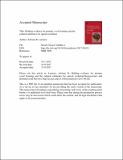Bidding evidence for primate vocal learning and the cultural substrates for speech evolution
Date
12/2017Author
Funder
Grant ID
702137
Keywords
Metadata
Show full item recordAltmetrics Handle Statistics
Altmetrics DOI Statistics
Abstract
Speech evolution seems to defy scientific explanation. Progress on this front has been jammed in an entrenched orthodoxy about what great apes can and (mostly) cannot do vocally, an idea epitomized by the Kuypers/Jürgens hypothesis. Findings by great ape researchers paint, however, starkly different and more optimistic landscapes for speech evolution. Over twenty studies qualify as positive evidence for primate vocal (production) learning following accepted terminology. Additionally, the Kuypers/Jürgens hypothesis shows low etymological, empirical, and theoretical soundness. Great apes can produce novel voiced calls and voluntarily control their modification − observations supposedly impossible. Furthermore, no valid pretext justifies dismissing heuristically the production of new voiceless consonant-like calls by great apes. To underscore this point, new evidence is provided for a novel supra-genera voiceless call across all great ape species. Their vocal invention and vocal learning faculties are real and sufficiently potent to, at times, uphold vocal traditions. These data overpower conventional predicaments in speech evolution theory and will help to make new strides explaining why, among hominids, only humans developed speech.
Citation
Lameira , A R 2017 , ' Bidding evidence for primate vocal learning and the cultural substrates for speech evolution ' , Neuroscience and Biobehavioral Reviews , vol. 83 , pp. 429-439 . https://doi.org/10.1016/j.neubiorev.2017.09.021
Publication
Neuroscience and Biobehavioral Reviews
Status
Peer reviewed
ISSN
0149-7634Type
Journal item
Rights
© 2017 Elsevier Ltd. This work has been made available online in accordance with the publisher’s policies. This is the author created, accepted version manuscript following peer review and may differ slightly from the final published version. The final published version of this work is available at https://doi.org/10.1016/j.neubiorev.2017.09.021
Description
This project has received funding from the European Union’s Horizon 2020 Research and Innovation Programunder the Marie Skłodowska-Curie Grant Agreement No. 702137 attributed to the author.Collections
Items in the St Andrews Research Repository are protected by copyright, with all rights reserved, unless otherwise indicated.

